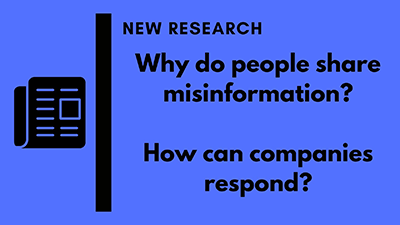Understanding corporate misinformation and the spread of environmental issues on social media
May 28, 2020

By Fan Yang, University at Albany, SUNY, and Holly Overton, University of South Carolina
Why do people share misinformation, especially when they know it may not be true? How do companies’ efforts to combat misinformation impact individuals’ trust in media sources?
We conducted a series of studies about the psychology behind the spread of misinformation about environmental issues on social media. The results suggest that people share misinformation for self-protection and self-enhancement. Dispute messages, communication that points out errors in disinformation claims, decrease trust in the media and sometimes strengthen individuals’ original beliefs, even if they are based on inaccurate information.
While scholarship has begun to widely examine the concept of misinformation on social media, our studies aimed to identify how and why it spreads in the first place. We conducted two online experiments to address these questions.
Our first study examined people’s intentions to share information both before and after that information is disputed while accounting for other factors such as personal relevance, anxiety, news credibility, and an individual’s need for self-validation. We found that dispute messages are generally effective, but that other psychological factors need to be considered.
For example, when people are anxious about what they read or if they personally have a strong need to achieve social status on social media, they are more likely to share misinformation. They are also likely to share misinformation if they receive the information from a source that reinforces their beliefs about an issue. Based on these findings, we offer the following advice to social media companies:
Be socially responsible.
Combat misinformation with dispute messages.
Misinformation gains power when it is repeated and passed along among individuals. While social media companies cannot completely stop the spread of misinformation, research offers empirical evidence that flagging dubious information does help decrease the virality of misinformation. While some individuals may still find self-motivated reasons to spread misinformation, social media companies have a responsibility to society to make honest efforts to combat misinformation on their platforms.
Our second study examined how media source credibility, news disputes, perceptions of risk, and pre-existing attitudes toward gene editing impact individuals’ attitudes toward a biotechnology company and trust in the media source.
We found that a dispute message is impactful in invoking attitude change among individuals who held stronger negative pre-existing attitudes toward a company and that these messages decreased trust in the media source. Therefore, we offer the following suggestion for companies and media organizations:
Garner favor among consumers through efforts that actively dispute misinformation.
In fact, companies can even reach consumers with previously disapproving attitudes. However, media organizations’ reputations can be particularly vulnerable from dispute messages. If information is, in fact, displayed as misinformation, this could be a positive outcome to hold media organizations responsible for responsible reporting. However, in the event that a dispute message may not necessarily be truthful, any media organization’s reputation can be easily tarnished.
There is still much to be investigated about misinformation on social media in a variety of contexts. Our study findings take a first step to better understanding psychological motivations that drive misinformation sharing behaviors about environmental issues and the effect of disputing information on biotechnology corporations and media organizations.
This study was funded by a 2018 Page/Johnson Legacy Scholar Grant.

